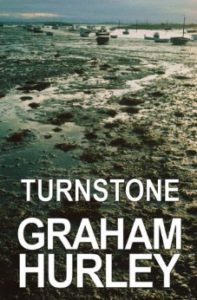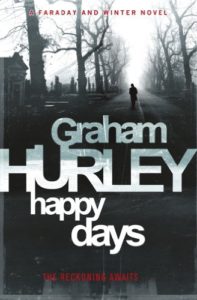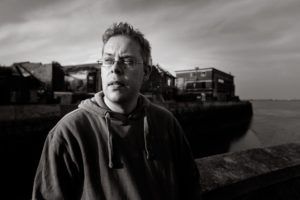Guest Post – Nick Quantrill: Serial Heroes
The third run of Serial Heroes continues.
As a reader I worry that I am missing out on some great books, there are so many talented authors and as any bookworm will remind you “so many books, so little time.” So I am asking some of my favourite authors if they will join me to talk about their favourite books. Or more specifically their favourite series of books.
I want to know about the characters they enjoy revisiting, the new release that they will most look forward to or the books on their bookcase that they return to over and over again.
Fresh from the happy chaos that is Harrogate I am delighted to welcome Nick Quantrill back to Grab This Book. I particularly enjoyed reading Nick’s selection as I will confess that this is a series I have yet to read so I can happily grow my TBR pile…
 For someone with an aversion to writing police characters, I’ve always loved reading about them. My love affair with the procedural novel started when I picked up a DI Rebus novel by Ian Rankin after spotting it on my father’s bookshelf. At the time I was studying Social Policy and Criminology with the Open University, and as much fun as Rebus proved to be, it was the way Rankin engaged with the issues I was learning about which really resonated. But I wanted more, a series which featured a location that chimed with my home city of Hull, the archetypal rundown northern city.
For someone with an aversion to writing police characters, I’ve always loved reading about them. My love affair with the procedural novel started when I picked up a DI Rebus novel by Ian Rankin after spotting it on my father’s bookshelf. At the time I was studying Social Policy and Criminology with the Open University, and as much fun as Rebus proved to be, it was the way Rankin engaged with the issues I was learning about which really resonated. But I wanted more, a series which featured a location that chimed with my home city of Hull, the archetypal rundown northern city.
Step forward Graham Hurley and DI Faraday. Hurley had been made an offer he couldn’t refuse – a three book deal with Orion. The catch? They had to be crime novels. The problem? Hurley, a documentary maker by trade was no fan of the genre. But shadowing a team of local detectives for a period triggered an awareness of what he could achieve with the format.
Opening with “Turnstone”, the DI Faraday series quickly widened to include the role of DS Paul Winter. Faraday is a man who feels the world, even if he doesn’t necessarily understand it, but will play by the rules to get his man. DS Paul Winter, brash and loud, knows that those rules sometimes have to bend a little and isn’t afraid to be the man who does it. But Hurley’s trump card is the introduction of major league criminal, Bazza Mackenzie.
From “Cut to Black” onwards, Mackenzie is the police’s long term major target and they have one shot to bring him down before he’s beyond their reach, his money legitimised in various projects around the city. But Mackenzie remains one step ahead, leaving Faraday empty handed and red faced. With the stakes increasing, Winter goes undercover, but discovering a taste for the dark arts of the criminal world, leaves to work as Mackenzie’s right hand man, a decision destined to set him on a collision course with Faraday.
The final essential character in the series is Portsmouth itself. A claustrophobic island city on the south coast of England with a proud sea-faring history, Hurley’s pulls no punches in a frank assessment of a city that now has multiple social problems. Hurley’s allows the city’s belligerence and unique identity to bleed into the characters, making them products of their environment, and all the more terrifying for it.
 The series comes to a close with “Happy Days”. Mackenzie, with his business empire crumbling to dust in the recession, seeks real power by running for Parliament in a local election. As this become all-encompassing, the lack of focus on his business empire offers Winter the opportunity to leave his employment. But you don’t leave the employment of people like Mackenzie by politely handing in your notice. For all the protagonists, there’s only one certainty – things have to be brought to a conclusion.
The series comes to a close with “Happy Days”. Mackenzie, with his business empire crumbling to dust in the recession, seeks real power by running for Parliament in a local election. As this become all-encompassing, the lack of focus on his business empire offers Winter the opportunity to leave his employment. But you don’t leave the employment of people like Mackenzie by politely handing in your notice. For all the protagonists, there’s only one certainty – things have to be brought to a conclusion.
The series stands an overview of recent times – feral children running amok, the war in Iraq, the economic meltdown, immigration, even the changing nature of Premier League football – it all features. With Portsmouth acting as England in microcosm, The DI Faraday series appeals to the heart as much as it does to the head. Maybe it’s Hurley’s background in documentaries that gives him the edge over his contemporaries and adds a further layer of authenticity, but it’s a series which looks the world in the eye and asks the questions which have no easy answers.
All of Graham Hurley’s books can be ordered with a simple click through this link.
 Mr Nick Quantrill also has many fine books which I would urge you to enjoy too. Nick’s books are found here.
Mr Nick Quantrill also has many fine books which I would urge you to enjoy too. Nick’s books are found here.
When Nick’s new novel The Dead Can’t Talk launched he joined me to talk about Evil Bad Guys – you can catch that here.
You can also visit www.nickquantrill.co.uk